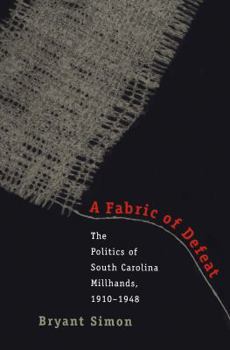Fabric of Defeat
Select Format
Select Condition 
Book Overview
Taking a broad view of politics, Simon looks at laborers as they engaged in political activity in many venues--at the polling station, on front porches, and on the shop floor--and examines their political involvement at the local, state, and national levels. He describes the campaign styles and rhetoric of such politicians as Coleman Blease and Olin Johnston (himself a former millhand), who eagerly sought the workers' votes. He draws a detailed picture of mill workers casting ballots, carrying placards, marching on the state capital, writing to lawmakers, and picketing factories. These millhands' politics reflected their public and private thoughts about whiteness and blackness,
war and the New Deal, democracy and justice, gender and sexuality, class relations and consumption.
Ultimately, the people depicted here are neither romanticized nor dismissed as the stereotypically racist and uneducated "rednecks" found in many accounts of southern politics. Southern workers understood the political and social forces that shaped their lives, argues Simon, and they developed
complex political strategies to deal with those forces.
Related Subjects
20th Century Business & Finance Business & Investing Economics History Labor & Industrial Relations Modern (16th-21st Centuries) Political History Political Science Politics & Government Politics & Social Sciences Popular Economics Social Science Social Sciences Sociology State & Local Textbooks




